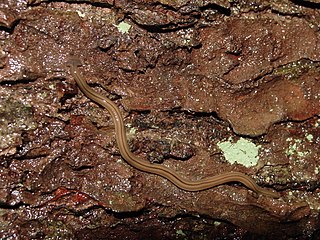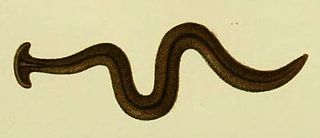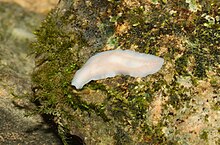
Dugesia is a genus of dugesiid triclads that contains some common representatives of the class Turbellaria. These common flatworms are found in freshwater habitats of Africa, Eurasia, and Australia. Dugesia is best known to non-specialists because of its regeneration capacities.

Planariidae is a family of freshwater planarians.
Romankenkius is a genus of freshwater planarian in the family Dugesiidae.

Geoplanidae is a family of flatworms known commonly as land planarians or land flatworms.

Bipalium is a genus of large predatory land planarians. They are often loosely called "hammerhead worms" or "broadhead planarians" because of the distinctive shape of their head region. Land planarians are unique in that they possess a "creeping sole", a highly ciliated region on the ventral epidermis that helps them to creep over the substrate. Native to Asia, several species are invasive to the United States, Canada, and Europe. Some studies have begun the investigation of the evolutionary ecology of these invasive planarians.

Continenticola is a clade that includes the land planarians (Geoplanidae) and the freshwater triclads.

Dugesiidae is a family of freshwater planarians distributed worldwide. The type genus is Dugesia Girard, 1850.

Girardia is a genus of freshwater planarians belonging to the family Dugesiidae.

Maricola is a suborder of triclad flatworms including species that mainly inhabit salt water environments. However, some species are also known from freshwater or brackish waters.

Planarioidea is a superfamily of freshwater triclads that comprises the families Dendrocoelidae, Kenkiidae and Planariidae.

Geoplanoidea is a superfamily of freshwater and land triclads that comprises the species of the Geoplanidae and the Dugesiidae families.

Kenkiidae is a family of freshwater triclads. Their species can be found sporadically in caves, groundwater, and deep lakes in Central Asia, Far East and North America.
Neppia is a genus of dugesiid triclad that is found in South America, Subantarctic region, Africa, Tasmania and New Zealand.

Bdellocephala is a genus of freshwater triclad that inhabits different regions of Eurasia.

Geoplaninae is a subfamily of land planarians endemic to the Neotropical region. Members of this family are sometimes referred to as the Neotropical land planarians. However, one species, Obama nungara has been introduced in Europe.

Bipaliinae is a subfamily of land planarians found mainly in Madagascar, the Indian subcontinent and Southeast Asia, although some species have been introduced worldwide.

Caenoplanini is a tribe of land planarians in the subfamily Rhynchodeminae mostly found throughout the Australasian and Oceanian realms.
Pelmatoplaninini is a tribe of land planarians in the subfamily Rhynchodeminae.
Novibipalium is a genus of land planarians of the subfamily Bipaliinae.

Humbertium is a genus of land planarians of the subfamily Bipaliinae.














